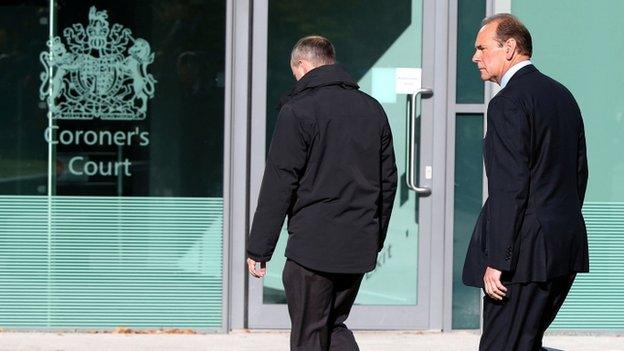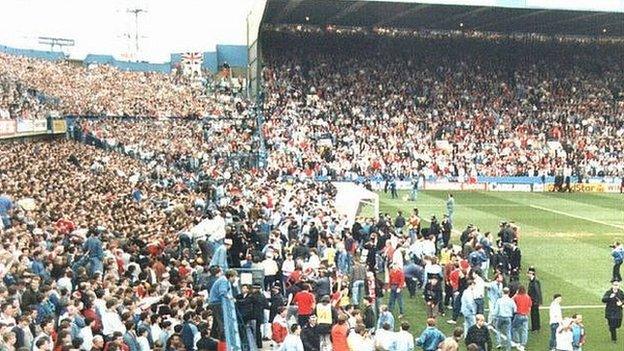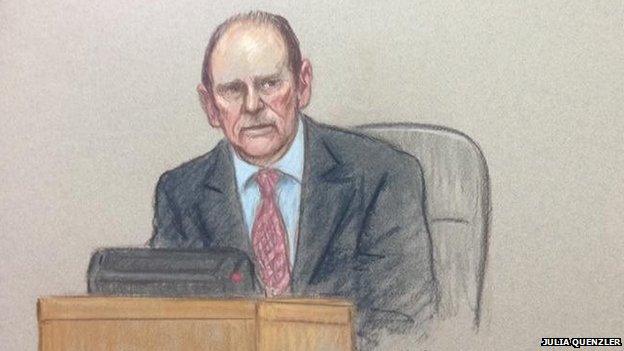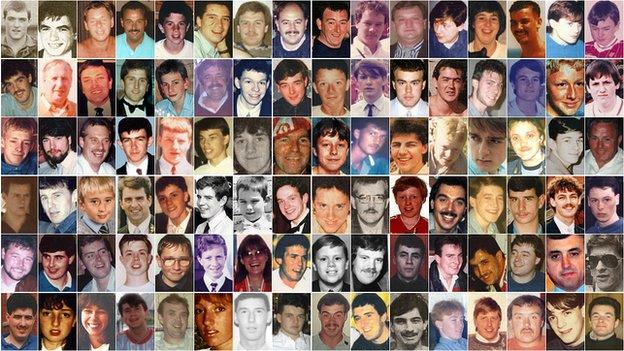Hillsborough: Sir Norman Bettison denies 'propaganda' role
- Published

Sir Norman Bettison has been giving evidence at the inquests in Warrington, Cheshire
A former police chief has denied being part of a "black propaganda unit" set up to blame Liverpool fans after the Hillsborough disaster.
Sir Norman Bettison was part of a team that gathered evidence about what had happened during the disaster for use at a public inquiry.
Giving evidence at the new inquests, he insisted he was "not embarrassed" about his work within South Yorkshire Police.
Ninety-six people died following a crush at the 1989 FA Cup semi-final.
Sir Norman also said it had "never occurred to him" to mention the work he did after the disaster in his application several years later for the position of chief constable of Merseyside Police.
The now-retired officer held that post between 1998 and 2004, before becoming chief constable of West Yorkshire Police.
The court, sitting in Warrington, Cheshire, heard his appointment on Merseyside created "strong feelings".

Ninety-six fans died following crushing at the Leppings Lane end of Hillsborough stadium on 15 April 1989
Sir Norman had been a chief inspector with South Yorkshire Police at the time of the disaster, and later joined the so-called "Wain Team" working at the force's headquarters.
He and his colleagues reported to Ch Supt Terry Wain and were tasked with gathering evidence about the disaster from officers who had been on duty at the match.
Sir Norman, who witnessed the disaster as a spectator, also attended the public inquiry in May and June 1989, and acted as a "liaison officer" for the force's chief officers.
The jury heard he applied for the Merseyside job in 1998, when he was an assistant chief constable in West Yorkshire.
His application form "did not mention" his work in South Yorkshire "in relation to Hillsborough", the court heard.
Peter Wilcock QC, who represents a group of the bereaved Hillsborough families, asked if Sir Norman was now "embarrassed" by his work on Hillsborough.
He also asked if "in spite of your attempts to distance yourself over the last 26 years, your work with the Wain inquiry inherently involved attempting to blame Liverpool fans, even when you personally knew they were not to blame".

An artist's impression of Sir Norman Bettison giving evidence at the inquests
Sir Norman replied: "Let me be clear, I'm not embarrassed by the issue.
"I was not involved in some black propaganda unit to put the blame on the fans."
He added that the "context" in 1998 was "very different from the context that you're trying to create in this courtroom".
He said in the nine years between the disaster and applying for the Merseyside job he had not been criticised for any of the work he had done relating to the disaster.
Asked by his own barrister, Paul Greaney QC, if he understood why the issue created "strong feelings" on Merseyside, Sir Norman said: "I genuinely didn't anticipate that but I did understand it immediately."
He said it did not occur to him to include any of his experiences at South Yorkshire Police in his application form because his work as an assistant chief constable in West Yorkshire was more relevant.
Mr Greaney said: "Did you deliberately conceal your role in the aftermath of Hillsborough from the selection panel or from anyone else concerning your appointment?"
Sir Norman replied: "No I didn't, nor have I."
The inquests, being held in Warrington, are scheduled to resume on Wednesday.

Who were the 96 victims?

BBC News: Profiles of all those who died
